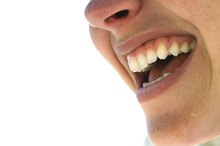Anti-Bacteria Solutions That Can Be Used With a Waterpik
If you have gum disease, a Waterpik is vital for cleaning under the gums, where a toothbrush is ineffective. Waterpiks are also useful in cleaning around braces. Using an anti-bacterial solution, instead of just water, gives a Waterpik the added ability to sanitize your mouth. Review the user’s manual to ensure that your Waterpik is approved for use with anti-bacterial solutions. Acceptable solutions for Waterpiks include those that do not contain bleach or iodine.
Antiseptic Mouthwashes
Antiseptic mouthwashes are alcohol-based solutions. Active ingredients commonly found in antiseptic mouthwashes include menthol, methyl salicylate and thymol. Antiseptic mouthwashes quickly and efficiently kill bacteria; however, you may want to avoid alcohol mouthwashes if you are prone to dry mouth, as alcohol absorbs moisture. Many major producers of antiseptic mouthwashes sell fluoride and children’s formulas.
- Antiseptic mouthwashes are alcohol-based solutions.
- Active ingredients commonly found in antiseptic mouthwashes include menthol, methyl salicylate and thymol.
Hydrogen Peroxide
Does a Waterpik Remove Tartar?
Learn More
If you prefer a non-alcohol mouthwash, use a solution of 1 part three percent hydrogen peroxide and 1 part water in your Waterpik 2. Hydrogen peroxide has anti-bacterial, anti-fungal and anti-viral properties 2. In addition to fighting bacteria, hydrogen peroxide is a suitable disinfectant for cuts and sores in the mouth 2. It will also keep the inside of your Waterpik disinfected.
Chlorine Dioxide Mouthwashes
Used to disinfect public water supplies, chlorine dioxide mouthwash has strong antiseptic properties. Its oxidizing power also makes it effective in fighting halitosis. Chlorine dioxide mouthwashes are sold as either “stabilized” or “active.” Active mouthwash is a purer form of chlorine dioxide, whereas stabilized mouthwash is made with a sodium chlorite substitute 3. For optimum oxidizing ability, choose active solutions.
- Used to disinfect public water supplies, chlorine dioxide mouthwash has strong antiseptic properties.
- Active mouthwash is a purer form of chlorine dioxide, whereas stabilized mouthwash is made with a sodium chlorite substitute 3.
Related Articles
References
Writer Bio
Mason Howard is an artist and writer in Minneapolis. Howard's work has been published in the "Creative Quarterly Journal of Art & Design" and "New American Paintings." He has also written for art exhibition catalogs and publications. Howard's recent writing includes covering popular culture, home improvement, cooking, health and fitness. He received his Master of Fine Arts from the University of Minnesota.









